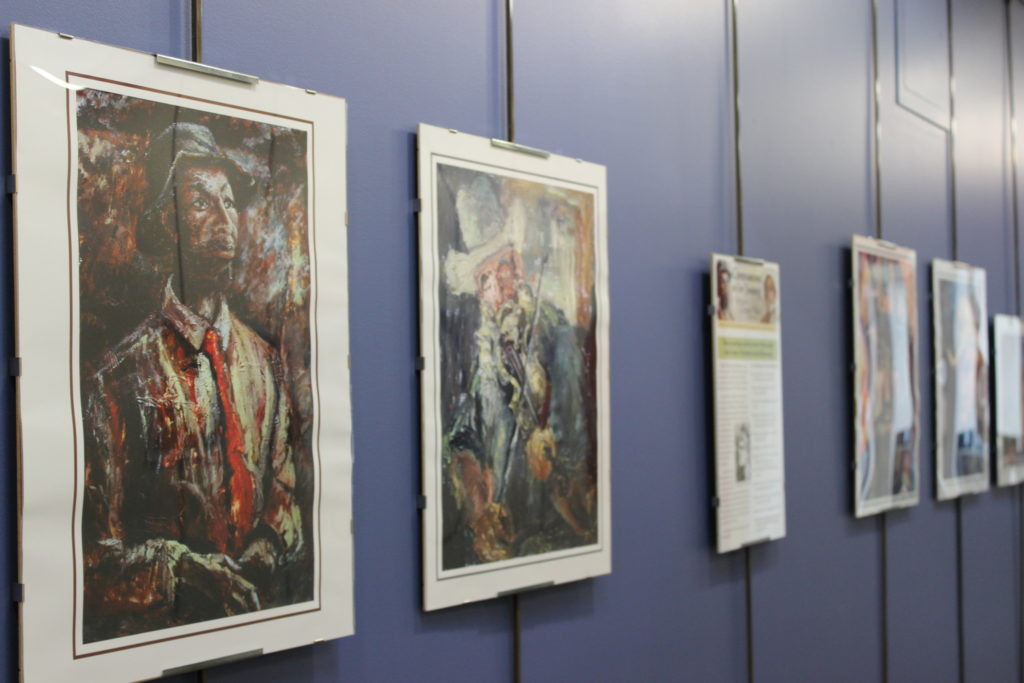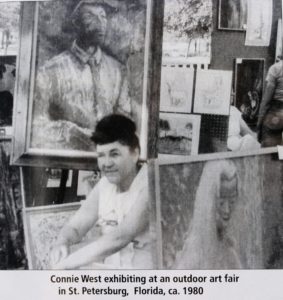Connie West
Connie West
 As of spring of 2017, the Long Wall Gallery at the Appalachian Center has been host to paintings from Connie West’s collection called Companions on her Journey. These particular paintings were collected and preserved by Wess Harris and Appalachian Community Services, Inc.
Connie West’s original name was Mabel Constance Adams. She was born in Corbin, Kentucky in 1908, and grew up, along with her sister Addie, primarily at a Catholic orphanage. Her father was a railroad engineer. Her mother died shortly after giving birth to her brother Jack.
Connie Adams enrolled at Lincoln Memorial University in Harrogate, Tennessee to study art and education. She also received a master’s degree in education from the University of Georgia, and later, another master’s degree in art from the Baltimore Institute of Art, where she later taught for some time.
As of spring of 2017, the Long Wall Gallery at the Appalachian Center has been host to paintings from Connie West’s collection called Companions on her Journey. These particular paintings were collected and preserved by Wess Harris and Appalachian Community Services, Inc.
Connie West’s original name was Mabel Constance Adams. She was born in Corbin, Kentucky in 1908, and grew up, along with her sister Addie, primarily at a Catholic orphanage. Her father was a railroad engineer. Her mother died shortly after giving birth to her brother Jack.
Connie Adams enrolled at Lincoln Memorial University in Harrogate, Tennessee to study art and education. She also received a master’s degree in education from the University of Georgia, and later, another master’s degree in art from the Baltimore Institute of Art, where she later taught for some time. In 1928, she married fellow student Don West. Don was an energetic, fiery figure who lived a complex public life of social critique, church ministry, social work, labor organizing, scholarship, and farming. Don is a well-known figure in Appalachian Studies; Connie is lesser known. Connie’s works of art were often featured in works of poetry published by her husband.
After 1929, Connie West pursued a career as a teacher, often moving schools, as her life with Don required. She spent periods caring for extended family and raising children. She co-worked with Don as a labor organizer. She, with her children, often spent long periods apart from Don, each doing their work. Biographers describe Connie West as an anchor for the family.
The Wests co-founded the Highlander Folk School (now known as the Highlander Research and Education Center) in New Market, Tennessee in 1932. The school was started with a “labor-centric” focus, hoping to unite workers in skilled and unskilled industries and create a progressive, racially integrated labor union.
In 1928, she married fellow student Don West. Don was an energetic, fiery figure who lived a complex public life of social critique, church ministry, social work, labor organizing, scholarship, and farming. Don is a well-known figure in Appalachian Studies; Connie is lesser known. Connie’s works of art were often featured in works of poetry published by her husband.
After 1929, Connie West pursued a career as a teacher, often moving schools, as her life with Don required. She spent periods caring for extended family and raising children. She co-worked with Don as a labor organizer. She, with her children, often spent long periods apart from Don, each doing their work. Biographers describe Connie West as an anchor for the family.
The Wests co-founded the Highlander Folk School (now known as the Highlander Research and Education Center) in New Market, Tennessee in 1932. The school was started with a “labor-centric” focus, hoping to unite workers in skilled and unskilled industries and create a progressive, racially integrated labor union.
 Connie West died in West Virginia in 1990 at the age of 81. Most of her work has been out of the public view since her passing, but starting in the late 2000s, many of her works were provided to the West Virginia Division of Culture and History by Ann Williams, Connie’s daughter, and Wess Harris, publisher of When Miners March by William C. Blizzard. These donations paved the way to allowing Connie’s works to be more widely appreciated.
Wess Harris, farmer, educator, founder and president of Appalachian Community Services, Inc., collected and preserved the portraits seen in this exhibit. Wess is a farmer, educator, and progressive activist living in central West Virginia. He has trained as a sociologist, but his most important credentials may be his background as a Union organizer and certified underground miner.
To learn more about Connie West come visit The Appalachian Center’s gallery exhibit of her paintings (available until September 2017) or search through Faber Library for works written and edited by Wess Harris, such as Dead Ringers: Why Miners March – Buried Truth from the Mountains or Truth Be Told: Perspectives on The Great West Virginia Mine War.
For access to the digital archives of Connie West’s full collection, go to https://folklifecenter.org/connie-west-painting-archives.
Article Written by Ciara Felty
Connie West died in West Virginia in 1990 at the age of 81. Most of her work has been out of the public view since her passing, but starting in the late 2000s, many of her works were provided to the West Virginia Division of Culture and History by Ann Williams, Connie’s daughter, and Wess Harris, publisher of When Miners March by William C. Blizzard. These donations paved the way to allowing Connie’s works to be more widely appreciated.
Wess Harris, farmer, educator, founder and president of Appalachian Community Services, Inc., collected and preserved the portraits seen in this exhibit. Wess is a farmer, educator, and progressive activist living in central West Virginia. He has trained as a sociologist, but his most important credentials may be his background as a Union organizer and certified underground miner.
To learn more about Connie West come visit The Appalachian Center’s gallery exhibit of her paintings (available until September 2017) or search through Faber Library for works written and edited by Wess Harris, such as Dead Ringers: Why Miners March – Buried Truth from the Mountains or Truth Be Told: Perspectives on The Great West Virginia Mine War.
For access to the digital archives of Connie West’s full collection, go to https://folklifecenter.org/connie-west-painting-archives.
Article Written by Ciara Felty